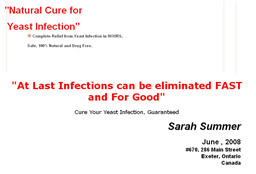Yeast infections are the second most common type of vaginal infection (bacterial vaginosis is the most common). Over 70% of women will develop at least one yeast infection during their life and over 40% of women will have recurring episodes.
What causes yeast infections?
As mentioned, yeast infections are caused by an imbalance of the natural amount of yeast present in the human body. Some common causes of this imbalance include:
- Antibiotic treatments
- Oral contraceptives
- Hot weather or non-ventilating clothing, which increase moisture and warmth, fostering fungal growth
- Repeated intercourse over a short period of time
- Stress
- Suppressed immune system (including HIV)
- High carbohydrate intake, especially refined sugars and alcohol
- Pregnancy
- Diabetes
Other common causes include irritants such as soaps, powders, detergents and other products that come in contact with the skin
How do you tell if you have a yeast infection? Symptoms of a typical yeast infection may include:
- Vaginal itching
- Vaginal irritation
- Thick, white, possibly curd-like vaginal discharge
- Redness, swelling, and/or cracking of the vulvar skin
- Burning sensation during urination
- Itching of the rectal opening
- Pain during sexual intercourse
And ladies, you'll be interested to know that men can also contract yeast infections. Most commonly they get yeast infections from having unprotected sexual activity with a partner who has a yeast infection. If both partners are not treated, they will keep re-infecting each other. Male sexual partners develop genital irritation and itching, especially if they are uncircumcised, but usually there is no discharge.
Of course, regardless of yeast infection causes and symptoms, the infections should be diagnosed and treated by a medical professional. There are over-the-counter medications available for women who have previously had professional guidance about yeast infections. But if you are unsure if what you have is a yeast infection, you should always seek professional advice. What you think is a yeast infection may actually be a more serious condition such as chlamydia or gonorrhea. Recent studies have found that many women misdiagnose their own yeast infections and treat it using use one of the over-the-counter treatments when in fact no yeast infection is actually present.
If you suspect that what you have is a yeast infection, whether based on symptoms or your past experiences with these infections, and there has been no change in your sexual history (no new partner, no unprotected genital contact), you may elect to try one of the over-the-counter yeast treatments first. If your symptoms do not go away, you should then see your medical provider for an exam.
Is there a way to prevent yeast infections?
There are some common sense ways to minimize your chances of getting a yeast infection. These include:
- Eat a balanced diet
- Get enough sleep
- If you go swimming, get out of your swimsuit as soon as possible
- Don't wear pads or panty-liners beyond the length of your period
- Don't use deodorant tampons
- Avoid feminine deodorant sprays and douches. They irritate the vulva and vaginal areas
- Wipe from front to back after urination and bowel movement
- Antibiotics can also cause a yeast infection, since they kill or decrease normal flora. If you need to take antibiotics, you can ask for an anti-yeast prescription, or you can buy over-the-counter creams or suppositories
- Avoid tight-fitting clothing and wear cotton, rather than synthetic, underwear
Here is just one of the many proven remedies for yeast infections that has helped thousands of women.

No comments:
Post a Comment